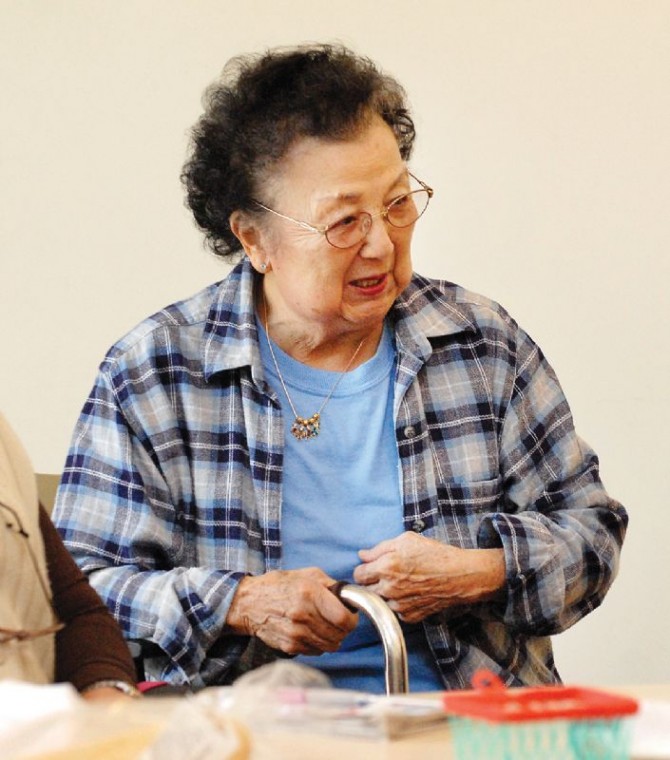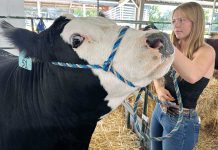Japanese-American perseveres through hardships, now enjoys days
filled with family and friends
By Peggy Thompson – Special to the Times
Indomitable. A word personified by an elderly Morgan Hill woman who has faced and overcome horrific challenges during her long life and still clings to a motif based on family unity and “never give up.”
Sumi Kusayanagi nee Sakai was born in 1926 on Vashon Island, Wash. Her parents were Issei, or first-generation Japanese, who farmed and tended strawberry fields, grew peas and other vegetables, helped by their three sons and three daughters. Kusayanagi was a tomboy, she said. “They would be in the field, picking, and I skipped away, climbing to the top of a tree and swaying back and forth.” Life continued and the children grew. “We were so happy,” she remembered. Then came the Dec. 7, 1941 attack by the Japanese navy on Pearl Harbor.
Their uncomplicated lives were turned upside down, almost overnight. Urged by then California Attorney General Earl Warren to move all Japanese from the West Coast, President Franklin Delano Roosevelt issued an executive order that mandated removal and ordered that the Japanese population be placed in War Relocation Camps for reasons of national security. “Why did we have to move”? she asked, “We were American citizens.”
Allowed to carry only two suitcases each, the eight members of her family piled on layer after layer of clothing as they had no idea of their final destination. Pushed onto a boat to Seattle, they were transferred to a crowded train headed for an interim assembly center in Pinedale. “It was hot as hell,” she said, “and we had so many clothes on.” Some assembly centers were set up at fairgrounds and racetracks, or migrant camps. Pinedale was comprised of warehouses, where the detainees stayed until facilities were opened for the next move.
Sumi would spend the next few years of her life at the Tule Lake Segregation Center, located on 26,000 arid acres near the California-Oregon border. The family, all eight, moved into two rooms of an old barracks building. The rooms were dusty from dirt seeping up between spaces in the floorboards, had no window screens or toilet facilities and no kitchen. She said they had to hang sheets to partition the space so the boys and girls could have a minimum of privacy. All 18,000 Japanese residents of the camp ate in mess halls, three times a day and used latrines. Photos of Tule show row after row of dreary buildings – surrounded by barbed wire fences. Guard towers with armed military personnel added to a concentration camp atmosphere.
Teens like Sumi and her siblings attended school during the day and were allowed to continue Japanese language and history classes in the evening. The internees tried to maintain normal lives; she worked as a waitress in the mess halls and also as a mail sorter in the post office. New clothes were not available. Sumi said her family couldn’t afford to buy from catalogues. She had started a home economics class hoping to learn sewing, but the war ended before the class got underway.
“I felt like the country let me down – why were we singled out – but we had to do what the president ordered,” she said about the internment
While not expressing any bitterness she said, “I felt so sorry for my parents; they lost their pride.” And more, after they evacuated Vashon Island, the farm was destroyed.
The experience was something that you can never forget, she added. After the war, her parents were sent to work in King Hill, Idaho; the girls were relocated to Oakland, where they served as domestics. The boys were sent to other farm areas.
Sumi was employed as a maid for five years in Oakland, where she met Tom Kusayanagi, whom she would marry. Her job included housework, cooking, “everything” and she was rewarded with room and board and a small stipend, which she saved.
Her oldest brother encouraged the family to move to California. They were reunited at the Driscoll Ranch, once more facing life in a barracks, but a much larger one. “It was a shack, but it was a start and we kept the floor spotless,” said Sumi. Pooling resources, the family purchased a washing machine and as they made and saved money, they bought property where the sons and daughters worked for the parents. On about five acres, they grew and tended berries, apricots and prunes that were processed at the Driscoll Cannery in San Martin. A crate of strawberries was presented to then Governor Earl Warren at the dedication ceremony for Anderson Dam. Sumi made the presentation. Did she have a new dress for the event? “No, I was a farm girl and wore work clothes – but I think my mother made me a bonnet.” The family later purchased the Kraft Ranch on Cochrane Road, where strawberry and prune culture continued.
After she and Tom married, they lived in a small house on a ranch. Years later, they acquired a place on Third Street in Morgan Hill and a dream came true for Sumi. She had completed beauty school and opened a shop in their renovated garage. And kept it open for 18 years in addition to caring for their young son, Gordon, cleaning houses, working in rest homes and the ongoing ranch work. Sumi said
that she worked to survive.
Disaster struck two days before her scheduled 1988 retirement, when she was pinned between two cars, breaking both legs and suffering severe injuries. Advised that the legs must be amputated or she would never walk again, Sumi resisted. She refused to go along with the diagnosis and didn’t give up.
Where did she get the courage? Her husband built a box on the patio that she could see from her bed as she recovered. It was filled with her favorite flowers, daffodils. She said she watched as the flowers were knocked down by heavy rain and hail and came up to bloom brightly again. This gave her the courage to heal and get on with her life.
She needed that courage in September 2005 when Gordon, her only child, was mowed down on a Las Vegas sidewalk by a mentally ill man. Gordon and two others were killed; many were hurt. The tragedy left Sumi wounded, but she has managed, once more, to move on. The family established the Gordon Rocks Music Scholarship Foundation that annually raises scholarship funds for local high school students.
Today, she fills her days with family activities and friends at the Morgan Hill Senior Center where she likes to help others and contribute to center activities. At 84, this woman’s unwrinkled face belies her age as does her approach to life. When asked if she was ready to call it a life, she smiled, “No, my family – my grandchildren.” A constant reminder of her grandson, adopted granddaughter, and four great-grandsons hangs on a necklace. Five tiny boy figures and one girl sparkle against her red sweater.
Sumi represents a generation that is growing exponentially and soon will be joined by a massive influx of baby boomers as they too, reach senior citizen status.
This monthly column will focus on the lives and contributions of older citizens, who deal daily with aches and pains, worries and challenges, but still can enjoy a good laugh.








